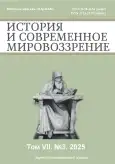Development of economic and scientific-technical cooperation between the USSR and CMEA member countries at the turn of the 1960s and 1970s
- 作者: Bodrova E.V.1, Kalinov V.V.2
-
隶属关系:
- «MIREA — Russian Technological University»
- National University of Oil and Gas «Gubkin University»
- 期: 卷 7, 编号 3 (2025)
- 页面: 96-102
- 栏目: ECONOMIC HISTORY
- URL: https://bakhtiniada.ru/2658-4654/article/view/350150
- DOI: https://doi.org/10.33693/2658-4654-2025-7-3-96-102
- EDN: https://elibrary.ru/iypfnp
- ID: 350150
如何引用文章
详细
This publication, using declassified archival documents from the collection of the Central Committee of the CPSU, Russian State Archive of Contemporary History, examines the development of economic, scientific, and technical cooperation between the USSR and CMEA member countries in the late 1960s and early 1970s. It concludes that objective conditions had emerged that facilitated the intensification of integration processes within the Council for Mutual Economic Assistance. The events of 1968 in Czechoslovakia can be rightfully considered a catalyst for these processes, but the determining factors were the pressing problems within CMEA in the areas of planning and pricing that needed to be addressed as quickly as possible. Party and state governance methods also played a role. A study of the positions of the allied countries reveals that the leadership of the Polish People's Republic was the most active initiator of the development and implementation of a special comprehensive program aimed at strengthening coordination and integration within the Council for Mutual Economic Assistance (CMEA). Information contained in the reports and documents of planning bodies suggests that the established mechanism significantly increased trade turnover, created joint ventures, and intensified scientific and technical exchange. Overall, the reorganizations proved their effectiveness. An example was the interaction between the Polish People's Republic and the USSR, particularly in the area of Soviet hydrocarbon supplies in excess of planned volumes and the provision of loans. In turn, the volumes of machinery and equipment supplied from the Polish People's Republic to the USSR, as well as pipes of the required diameter for oil pipelines, increased. However, the CMEA countries largely developed import-substituting, low-tech, low-volume production systems characterized by high costs. Structural restructuring failed, innovation processes were stalled, and technological backwardness grew.
作者简介
Elena Bodrova
«MIREA — Russian Technological University»
编辑信件的主要联系方式.
Email: evbodrova@mail.ru
ORCID iD: 0000-0001-7889-3054
Dr. Sci. (Hist.), Professor, Head of the Department of Humanities and Social Sciences
俄罗斯联邦, MoscowVyacheslav Kalinov
National University of Oil and Gas «Gubkin University»
Email: kafedra-i@yandeх.ru
ORCID iD: 0000-0002-9709-7720
Dr. Sci. (Hist.), Associate Professor, Head of the Department of History
俄罗斯联邦, Moscow参考
- Afanasyev A. A. Comparative analysis of models of foreign economic integration of the late USSR, the post-Soviet period and the current stage of Russia's development. Economic Relations. 2023. Vol. 13. No. 1. Pp. 159–180. (in Rus.) doi: 10.18334/eo.13.1.115238.
- Bagudin P., Gavrilov E. Improving the sectoral structure of industry in the CMEA countries. Questions of Economics. 1983. No. 2. Pр. 97–106. (in Rus.).
- Bakovetsky O., Gavrilov V. Expansion of direct links between economic units of the USSR and the CMEA countries. Planned Economy. 1983. No. 10. Pр. 98–104. (in Rus.).
- Buga V. The Main Trends in the Development of Soviet-Romanian Relations at the Highest Level in the Second Half of the 1970s — First Half of the 1980s. Slavic Almanac. 2023. No. 1–2. Pp. 132–158. (in Rus.) doi: 10.31168/2073-5731.2023.1-2.1.07.
- Bodrova E. V., Kalinov V. V., Efremenko V. V. On the situation that developed in the countries of the Council for Mutual Economic Assistance after the “Prague Spring” of 1968 (based on declassified archival documents). Caspian region: Politics, Economics, Culture. 2024. No. 4 (81). Pр. 121–132. (in Rus.) doi: 10.54398/1818-510X.2024.81.4.011.
- Vardomsky L. B. Between Geopolitics and Economics: Issues of International Transit Development in the USSR and Russia. Geoeconomics of Energy. 2021. No. 1 (13). P. 24–42. (in Rus.) doi: 10.48137/2687-0703_2021_13_1_24.
- Vardomsky L. B. Forgotten Integration: Failure and Lessons of the Council for Mutual Economic Assistance. Contours of Global Transformations: Politics, Economics, Law. 2020. Vol. 13. No. 3. Pp. 176–195. (in Rus.) doi: 10.23932/2542-0240-2020-13-3-10.
- Vedernikov M. V. Transformation of Soviet-Czechoslovak relations after the Velvet Revolution (1989–1991). Bulletin of the N.I. Lobachevsky University of Nizhny Novgorod. 2018. No. 3. Рp. 9–17. (in Rus.).
- Zhiryakov I. G. The European Community and the Council for Mutual Economic Assistance in the 1970s. In the context of West-East relations. Bulletin of Moscow State University. Series: History and Political Sciences 2016. No. 4. Pр. 59–67. (in Rus.).
- Lipkin M. A. “World Cooperative of Peoples”: The Council for Mutual Economic Assistance, which N. S. Khrushchev tried to build. New Historical Bulletin. 2017. No. 4 (54). Pр. 121–144. (in Rus.).
补充文件









